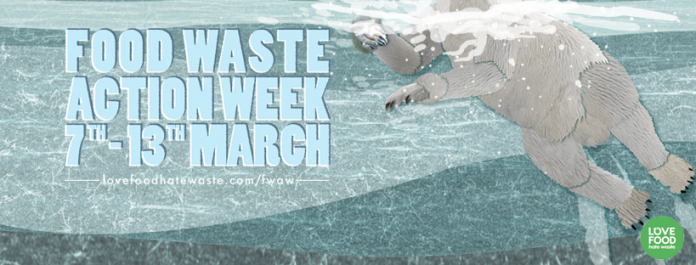
The second annual Food Waste Action Week has begun! Running from 7th to 13th March, Armagh City, Banbridge and Craigavon Borough Council has joined the campaign to help raise awareness of the huge impact of household food waste on climate change, as well as sharing practical advice, food savvy behaviours and tips on how to easily reduce the food we waste in our homes.
A staggering 6.6 million tonnes of household food waste is thrown away each year in the UK and is responsible for nearly 25 million tonnes of CO2 emissions. However, 4.5 million tonnes of this food could have been eaten, which amounts to around £60 a month for an average family with two children.
So, what can be done to help reduce this overwhelming waste, to help cut emissions and to save money at the same time? Here are a few easy tips.
Be a feezer hero. Freezing your uneaten food acts like a pause button, giving you more time to eat the food you have bought. Chicken, bacon and sausages and three key meat items that are often not used in time and end up in the bin – but can be frozen.
Make the most of your food by cooling leftovers as quickly as possible after cooking and store in the fridge. Eat within two days or freeze for another day.
Use your microwave to defrost items and avoid a lengthy overnight defrost.
Keep most of your fruit and veg in the fridge – it will last up to two weeks longer than in the cupboard.
Once opened, keep foods like ham and cheese in airtight containers or wrapped in cling film or tinfoil.
Don’t put bread in the fridge – it will go stale. Store in a cool, dry place. You can freeze slices though for use at a later date!
Make sure your fridge is between 0 and 5 degrees Celsius to preserve food for longer. If your fridge is too warm, food will not last long and milk will quickly go off.
“We all know that climate change is a huge issue that we need to play our part in addressing – but most of us won’t know the connection between food waste and climate change,” commented Alderman Glenn Barr, Lord Mayor of Armagh City, Banbridge and Craigavon.
“The average UK family wastes eight meals every week which is a shocking statistic. Every bit of wasted food has an environmental impact – transport, fuel, water, energy. So we all need to save food from the bin by changing the way we buy, store and use it to help the future of our planet as well as our own pockets as well.”
Sarah Clayton, from Love Food Hate Waste adds, “Getting to grips with freezing and defrosting are big factors in preventing food from going to waste at home. At a time of rising food prices alongside huge public concern about climate change, tackling food waste at home is one way we can all make a difference and save money. For the average family with children, the cost of binning food can be more than £700 per year. So, Food Waste Action Week is all about avoiding being savvy in how we store but then use our food.”
Head to https://www.lovefoodhatewaste.com/ for helpful tips and advice on safely freezing and defrosting your food as well as further information on how you can help.







